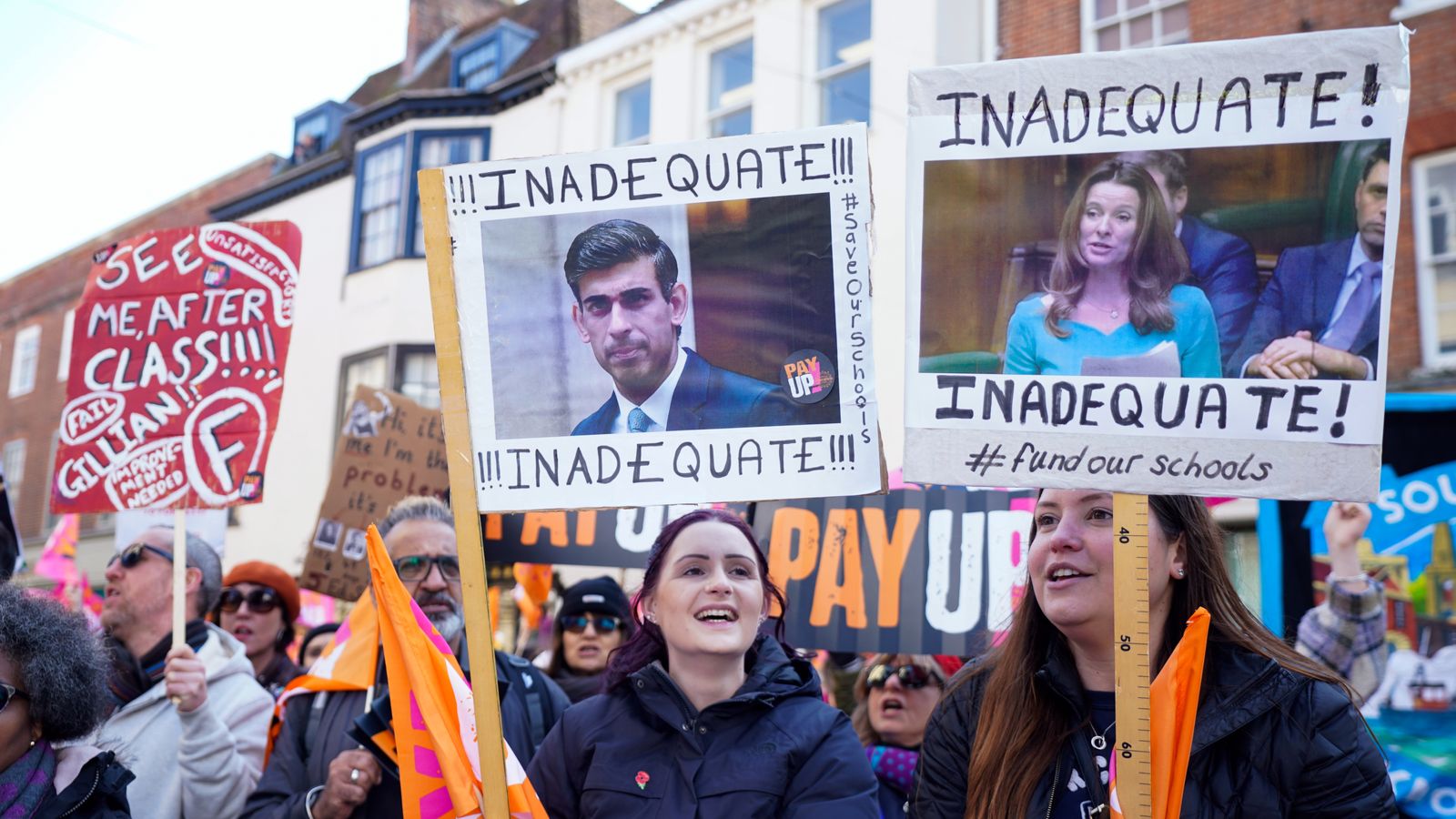Bid to end teacher strikes as government and education unions agree to hold ‘intensive talks’ on pay and workload

Teacher strikes will be paused for two weeks while education unions and the government hold “intensive” talks over pay, workload and conditions.
Education Secretary Gillian Keegan will meet with representatives today – with discussions to continue over the weekend until Sunday.
The National Education Union (NEU), National Association of Headteachers (NAHT), NASUWT The Teachers’ Union, and Association of School and College Leaders (ASCL) will all be involved in the negotiations.
The news follows the breakthrough in the NHS dispute on Thursday, with union leaders representing thousands of nurses, ambulance crews and other health workers agreeing to suspend further strikes while ballots are held on a new pay offer.
A joint statement from the Department for Education and unions said: “The government and the education trade unions… have agreed to move into a period of intensive talks.
“The talks will focus on teacher pay, conditions and workload reduction.
“In order for talks to begin and, we hope, reach a successful conclusion, the NEU has confirmed it will create a period of calm for two weeks during which time they have said no further strike dates will be announced.
“The education secretary and all unions will meet today, beginning intensive talks, which will continue over the weekend.”
Advertisement
Read more from Sky News:
Passport staff to strike for five weeks in risk to holidays
Boris Johnson re-selected for Uxbridge seat
Rolls-Royce gets funding for nuclear reactor on the moon
It comes after an estimated 300,000 teachers walked out in two days of strike action this week, with thousands of schools at least partially closed.
The NEU and the government have been locked in a stand-off about pay for weeks, with the union accusing Ms Keegan of refusing to make offers that could resolve the dispute in previous talks.
But the cabinet minister insisted the strike action was “unnecessary” and said she would engage in formal discussions if walkouts were called off.
Doctors also ‘open’ to talks
The government is also expected to meet with leaders of junior doctors to help resolve a separate pay dispute which led to a three-day walkout this week.
The British Medical Association (BMA) has exchanged letters with Health Secretary Steve Barclay following yesterday’s announcement of a new offer to other NHS workers, but no date has been set for a meeting.
Please use Chrome browser for a more accessible video player
2:39
Hope of NHS strikes breakthrough
Dr Vivek Trivedi, co-chair of the BMA’s junior doctors committee, told BBC Radio 4’s Today programme: “Our position has been that we are open to talk in good faith, meaningfully, at any time.
“We were ready to talk months ago. Our formal dispute started over 150 days ago and, again, that is just what I mean in that it is disappointing it has taken Steve Barclay so long to get to the negotiating table.
“I only hope that he does come with good faith and a mandate to negotiate.
“So far we haven’t arranged a time for this afternoon but there has been some correspondence between our offices so it does look like we’ll be able to set something up in the near future.”
A number of other NHS unions reached a “final” pay agreement with the government on Thursday, with most recommending members accept it.
Only Unite said the offer is not one it can recommend but it is for members to make the final decision.
The new offer amounts to a one-off payment of 2% of their salary plus a COVID recovery bonus of 4% for the current financial year 2022/23, and a 5% pay increase for 2023/24.
Ministers hope they can strike a similar deal with the BMA, calling its current demands “completely unaffordable”.
The union wants a “pay restoration” for junior doctors, saying their pay has fallen in real terms by 26% since 2008/09 and that reversing this would require a 35.3% pay rise.
In the latest headache for the government on strikes, the Public and Commercial Services (PCS) union has announced a five-week walkout by its members in the Passport Office in an escalation of its long-running dispute over pay, pensions, jobs and conditions.